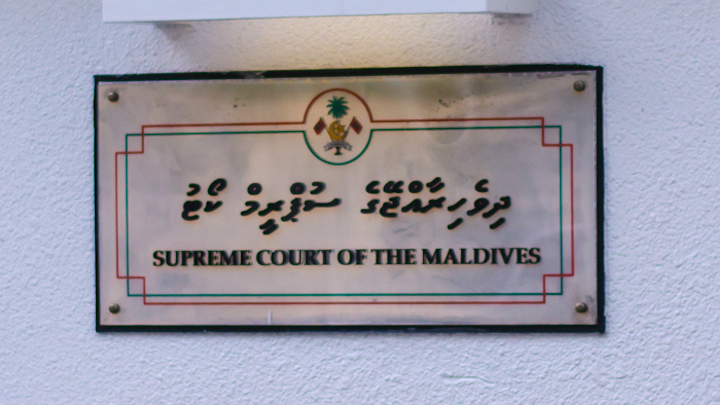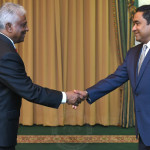A court last week ordered exorbitant compensation for two government officials sacked over allegations of sexual abuse. One was a policeman, fired in 2010 by the police disciplinary board, on a charge of ordering the rape of a young woman. The other was the former chair of the civil service, removed by the parliament in 2012 after an inquiry into an allegation of sexual harassment.
In Chief Inspector Risheef Thoha’s case, the Supreme Court ordered his reinstatement, citing insufficient evidence and due process violations. Risheef was given his job back only to be suspended on a new charge of alcohol abuse. On Monday, he was fired.
In Mohamed Fahmy Hassan’s case, the apex court ruled that the parliament could not remove him, unless he was found guilty in a court of law. Fahmy is now the Maldivian High Commissioner to Malaysia.
The compensation rulings came in the same week that the parliament removed the prosecutor general in a hurried vote, and issued on the same day the criminal court acquitted a police officer who was caught on camera brutalizing an opposition member.
These incidents raise the question – why are some officials never penalized?
The history
Risheef was sacked in 2010 along with three other police officers. The three allegedly abused the young woman in a police car on Risheef’s orders and threw her out naked on to the street, at dawn, infront of his house. Analysis of calls reportedly showed that Risheef and the three officers were in contact throughout the incident.
But the appellate courts, noting weaknesses in the inquiry against Risheef, including conflicting witness statements and questionable evidence, found his dismissal illegal. The Supreme Court went on to note due process violations, including a failure to allow him the right to speak in his defence.
In Fahmy’s case, he was alleged to have told a female employee that “it is not appealing when unmarried girls like you get fat,” whilst touching her on the stomach. A subsequent human rights commission investigation found that he sent a text message to the employee with an apology. However, the commission said that the reasons for his apology were not clear.
Overturning the parliament’s vote, Supreme Court Justice Abdulla Saeed said that an individual should be considered innocent unless proven guilty in a court of law. Justice Muthasim Adnan, however, argued that an inquiry by a parliamentary committee into misconduct was not a criminal investigation. Hence, the parliament was not required to prove guilt to the extent required during a trial.
Can courts review disciplinary action?
Former Attorney General Dhiyana Saeed said both cases touched upon the relationship between the courts and the other arms of the state, and more importantly, the scope of judicial review.
While courts are authorized to review any disciplinary action, judges must exercise such authority on well-defined grounds and subject themselves to judicial self-restraint, she said.
“I would say that the proper role should be to grant a certain ‘margin of appreciation’ to the government bodies in respect of its disciplinary actions, while also being vigilant to ensure respect for constitutional rights. In that sense, I would think that the courts ought to look at the procedural aspects and ensure that due process has been accorded while remaining cautious not to step into the shoes of the decision maker and actually remake that decision,” she said.
A single rule
Legal experts across the board describe the ruling in Fahmy’s case as a step taken by the Supreme Court to protect him.
Former member of the judicial watchdog, Aishath Velezinee, said the Maldivian courts are guided by a single rule.
“To understand any court action or verdict in the Maldives today, you have to look outside the law, look at the positioning of the person in question within the political spectrum. There you can actually observe consistency in court action… They systematically protect friends of the government and eliminate those fallen in favor.”
This is why Supreme Court Justice Ali Hameed was never suspended despite multiple videos that appear to show him fornicating with three foreign women in a Colombo hotel room, she has previously said.
The police, citing difficulties in identifying the individual in the video, have closed the case. Hameed is now the chair of the watchdog Judicial Services Commission.
The precedent set in Fahmy’s case is worrying, said a well-placed source, who is familiar with the workings of the judiciary. “It prevents the government from taking disciplinary action against staff who have done wrong, for example, caught stealing on security cameras, unless that charge is proven at court.”
Critics have meanwhile noted the Supreme Court has not intervened when other top state officials including former Auditor General Niyaz Ibrahim and former Prosecutor General Muhuthaz Muhsin were both removed by the parliament. Neither was convicted of any crimes in a court of law.
Legal fiascos
In Risheef’s case, many I spoke to, including senior police officers and legal experts, said the overturning of his dismissal was caused mainly by the failings of the police disciplinary board. Speaking on the security forces’ handling of disciplinary matters, Husnu Suood, a former civil court judge and a former attorney general, said both the police and the army pay very little regard to due process, both in cases where disciplinary action is warranted and unwarranted.
Instead of conducting proper inquiries, “these two institutions want to hide behind intelligence reports for all their actions,” he said. “And these intelligence reports contain nothing except for some unsubstantiated hearsay. They do not think they are accountable to anybody.
“Its time that their personnel divisions learn general employment law so that this kind of legal fiascos can be avoided in the future,” he added.
Meanwhile, a judge who was reluctant to give their name said the civil court has overturned a majority of dismissal cases lodged against the police. “In some cases, due process is not followed, which means the dismissal is invalid. This relates to access to legal counsel and right to defence. Then in cases where due process is followed, there is often no evidence to substantiate the charges.”
The disciplinary board’s arbitrariness is evident by the sacking of several offices, such as ex police intelligence chief Mohamed ‘MC’ Hameed, on flimsy charges, while those who were accused of brutalizing opposition protesters were never penalized.
In the cases of six policemen the police watchdog body recommended action against over a brutal crackdown on February 7 and 8 2012, the board said it would wait on the outcome of the court cases, according to a statement provided in parliament by current Attorney General Mohamed Anil.
The criminal court has since acquitted at least three officers.
Additional reporting by Mohamed Saif Fathih


















